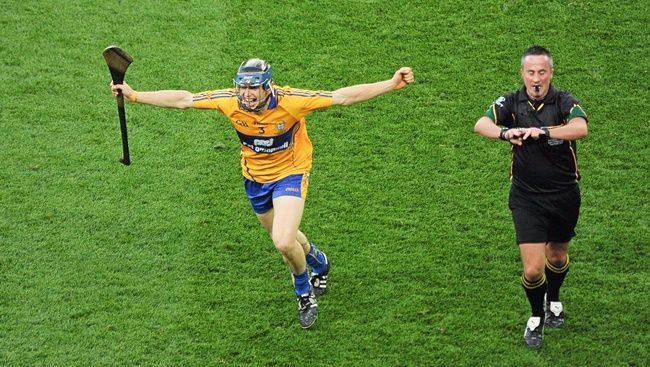David McInerney milked 100 cows the evening before Clare’s All-Ireland semi-final in 2013.
That was the year the Banner bridged a 16 year gap to lift Liam McCarthy for the first time since ’97. Their relentless, All-Star winning corner back proved a key player the whole way through that famous journey.
The Tulla club man was born and raised on a farm. His father Jim, nicknamed the ‘Bulldog’ because of his sheer aggression on the hurling field has no shortage of work on his west of Ireland set-up and David is never left idle.
Just like any farmer’s son, he was born into manual labour.
Between feeding calves, forking silage, herding the cattle and dosing the bullocks, there’s always jobs to be done. Tough, gritty character-building work and there’s no way out of it.
You get your hands dirty. You slog through the mucky fields, contend with animals who are fond of doing the exact opposite to what you want them to do and you suck it up.
There are loads of farmers in the GAA. Westmeath star John Heslin is perhaps the most pronounced. He regularly posts pictures of his yearling heifers, updates on his calving struggles this time of the year and often describes the strenuous task of loading lambs for the factory.
Every conversation I had this week I doubted the level of snow fall we would get. Point taken! Will someone make it stop now please? #beastfromtheeast #calving18 pic.twitter.com/apbJqkvPhA
— John Heslin (@jheslin14) March 1, 2018
He was born into that and that’s his way of life too. He loves it. So does Tipperary footballer Jimmy Feehan and Kilkenny hurlers TJ Reid and Lester Ryan, too.
That’s to name but a few because farming and the GAA are linked and always have been.
An Allianz video released recently documented McInerney’s upbringing and his career to date as a hurler, and it’s clear as day that farming and Clare hurling share similar levels of prominence in his life.
"I was just kind of born into sport."
Take a look at the life, family & community of Clare hurler David McInerney.#AllianzLeagues pic.twitter.com/GE5ZcxtYkZ
— eir Sport (@eirSport) March 4, 2018
It certainly doesn’t hold him back, and here we run the rule over the aids and stops of balancing an agricultural life with a GAA career.
Benefits
1. Loads of walls and space
One of the best things about living on a farm is that you’ve acres of room to play around with. Loads of ground to puck ball over, endless amounts of walls to hammer the living daylights out of with a sliotar or football. You’ve grassy fields, you’ve targets to aim at. You’ve everything a town kid would love to have.
2. Character building work
You could be dagging a dirty sheep’s arse at 7.00 of a Saturday morning. You could be calving a cow in the middle of the night. That’s not easy and you probably won’t always be up for it but you don’t really have a choice because the work always has to be done.
No wonder this lunatic is so fit! Great craic of an evening with @corkery5 and @DScanaill 🐄🐄🐄 pic.twitter.com/lNnktaaxsv
— Bríd Stack (@BridStackie) July 30, 2015
That builds mental strength, it builds character and that’s more than half the battle for a GAA player. When you’re out on your feet in training, suffering and at your limit in a game, it’s experiences like those that stand you in good stead. You’ve been through pain like this and it didn’t defeat you then so why should it now?
3. Who needs a gym when you’re lifting 25kg bags of meal through a mucky field?
As well as being a slog mentally, farm work is a killer physically. Lifting bags of meal, hoisting troughs, feeders and bales to places you shouldn’t be able to reach but you manage it because, again, the work always has to be done.
Happy fathers day #FathersDay #🐶casper #🐮jasmine pic.twitter.com/cYoFUvdFCn
— TJ Reid (@_tjreid) June 19, 2016
That’s hard work. McInerney’s father often credits his son’s athleticism and bustling physique to the hard yards he’s put in on the farm in Tulla.
You won’t get out of shape easy on a farm.
5. No long treks to training
Farmers are self employed and most of them will be based at home. Their journeys to training will be easier and shorter than lads who’ve fled the nest for work and face a long commute after sitting in an office all day.
Hindrances
1. You can’t be in two places at once
It’s during the summer months when a GAA player is indispensable. Farming is a year-round job, but lads are particularly busy during the summer with silage being made, cows being milked twice daily and other jobs that earn their crust.
Something has to give, and farming is so uncertain and so unpredictable that players are often forced to miss training and games at the last minute.
2. Worked to exhaustion
It can be a tough balancing act. The GAA is only becoming more and more demanding on players with each passing year. Dosing cattle doesn’t get any easier.
Take for example a farmer’s life on the week of a big game. Doing the standard jobs will be the ideal way to limber up, but if something goes wrong, like the sheep breaking out of the field and tearing off down the road, someone’s going to have to chase them.
Something like that isn’t ideal preparation for a game.
All in all, the positives outweigh the negatives for the farmers, because even on the above point – being on your feet, keeping active most of the day will be more beneficial to players in terms of preventing injuries in comparison to lads sitting in an office all day.
Long live the GAA playing farmer.

















































